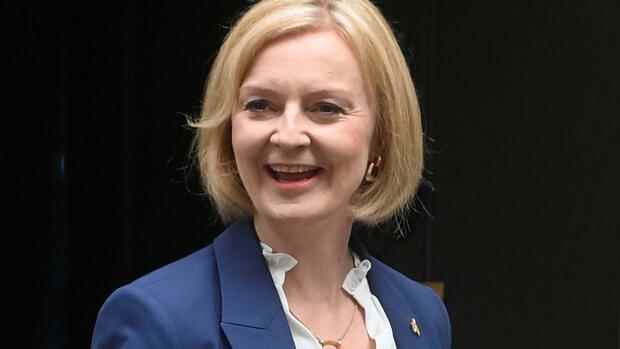London Great Britain is facing the biggest energy transition in decades – and the state is at the helm. The new British Prime Minister Liz Truss wants to combat the energy emergency in the United Kingdom with a three-point plan: Among other things, a government price cap should freeze gas prices for consumers at around the current level for two years. Distressed companies also receive a price guarantee for six months. Truss announced this on Thursday in the British House of Commons.
At the same time, the new government wants to exploit the oil and gas deposits in the North Sea more, rapidly expand nuclear power and renewable energies and lift the 2019 fracking ban. And finally, the electricity producers who do not generate their energy with gas should give up part of their windfall profits by voluntarily agreeing to new supply contracts at lower prices.
Overall, according to unofficial estimates, the aid package could initially cost 150 billion pounds (about 175 billion euros). Around £90 billion of that could initially go to the price cap for consumers, with a further £60 billion to help companies through the winter.
However, the actual costs depend on how much the government-controlled prices deviate from prices in the energy markets. The government plans to foot the bill with new debt, which is already making international investors nervous and has pushed the pound’s exchange rate against the dollar to its lowest level since 1985.
Top jobs of the day
Find the best jobs now and
be notified by email.
“Our plan guarantees prices, limits inflation and boosts economic growth,” Truss announced. She will ensure that Britain “never gets into the situation” of an energy emergency again. The prime minister promised that the country would become a net exporter by 2040. She wants to stick to the goal of making Great Britain climate-neutral by 2050.
Already the first course corrector
“This is not a panacea for the energy crisis, but at least the political will to do something about it can now be felt,” said British consumer advocate and investment advisor Martin Lewis, praising the government’s measures. The sharp rise in the cost of living is the biggest challenge for the new prime minister.
Truss already has to correct her economically liberal course: she had recently rejected direct financial aid (“hand-outs”), now, according to Ahmed Farman, analyst at financial services provider Jefferies, she is launching “the largest welfare program in recent British history”. Path.
>> Also read here: Who is Liz Truss? What challenges the new prime minister is facing
At the heart of the plan is a government price cap for gas that will fix the average UK household’s annual electricity and gas bills at around £2,500 (€2,900) for 24 months. If one also takes into account the one-off energy aid of £400 per household decided by the previous government in May, the annual energy costs remain roughly current.
Companies are initially only protected against price increases for six months. The Ministry of Economics and Finance is to check whether there will be further help for distressed companies. Together with the Bank of England, the government also wants to finance a fund of 40 billion pounds to ensure liquidity for energy companies.
Choosing to shift the cost onto the taxpayer could cause significant collateral damage. According to a forecast by the Institute for Fiscal Studies (IFS), the interest burden on the growing national debt will more than double to around £100 billion in the current financial year. That would be around 4.5 percent of gross domestic product.
The interest rate on ten-year British government bonds has already more than tripled to three percent since the beginning of the year. “The cost of government borrowing is rising very quickly,” said IFS chief Paul Johnson. The reason: Investors are demanding higher risk premiums for British government bonds. Truss hopes that the government’s price cap will lower the inflation rate by up to five percentage points, which would also reduce the government’s interest burden on inflation-linked bonds.
The prime minister refuses to pay at least part of the cost of government energy aid by extending the already existing excess profits tax on oil and gas producer profits. According to the latest opinion polls, a majority of conservative voters also support such a “windfall tax”.
>> Also read here: How do Handelsblatt readers feel about Liz Truss?
According to internal estimates by the Treasury, the UK energy industry could rake in £170 billion in windfall profits over the next two years. However, the prime minister prefers to see companies invest more in new energy sources. So far, however, a large part of the profits has flowed back to the investors in the form of share buybacks.
Bank of England plans further rate hikes
The Bank of England is also worried about high government spending. The central bankers concede that the price cap will initially dampen inflation. However, Huw Pill, the Bank of England’s chief economist, told Parliament’s Finance Committee on Wednesday that capped energy prices and Truss’s announced tax cuts could increase aggregate demand and thus fuel inflationary pressures.
The currency watchdogs would have to react with further interest rate increases if they want to bring the inflation rate back down from around ten percent to the target value of two percent.
More: Liz Truss’ conservative revolution will fail because of reality
